Black Lives Matter Philadelphia leader explains where police funds should be shifted
An organizer of Black Lives Matter Philadelphia explains where police funds should be shifted and diverted to community programs instead.
The Philadelphia arm of the Black Lives Matter movement has called for the "complete abolition" of the police department in five years as well as the scrapping of military bases abroad.
For more than a month, in the aftermath of George Floyd's death, the Black Lives Matter (BLM) movement has called for sweeping changes across the country in the bid to end racial injustices. At the heart of the debate is the campaign to defund – or dismantle – police departments.
And according to BLM Philadelphia organizer and activist YahNé Ndgo, the chapter has developed a five-year plan to do just that.
"One of the things that we are demanding over five years is the complete abolition. We don't want to see any police in our community," Ndgo told Fox News in an interview Tuesday. "Over the course of those five years, it gives time for the community to begin to build what is needed. We aren't looking to leave any kind of vacancy around the issue of safety."
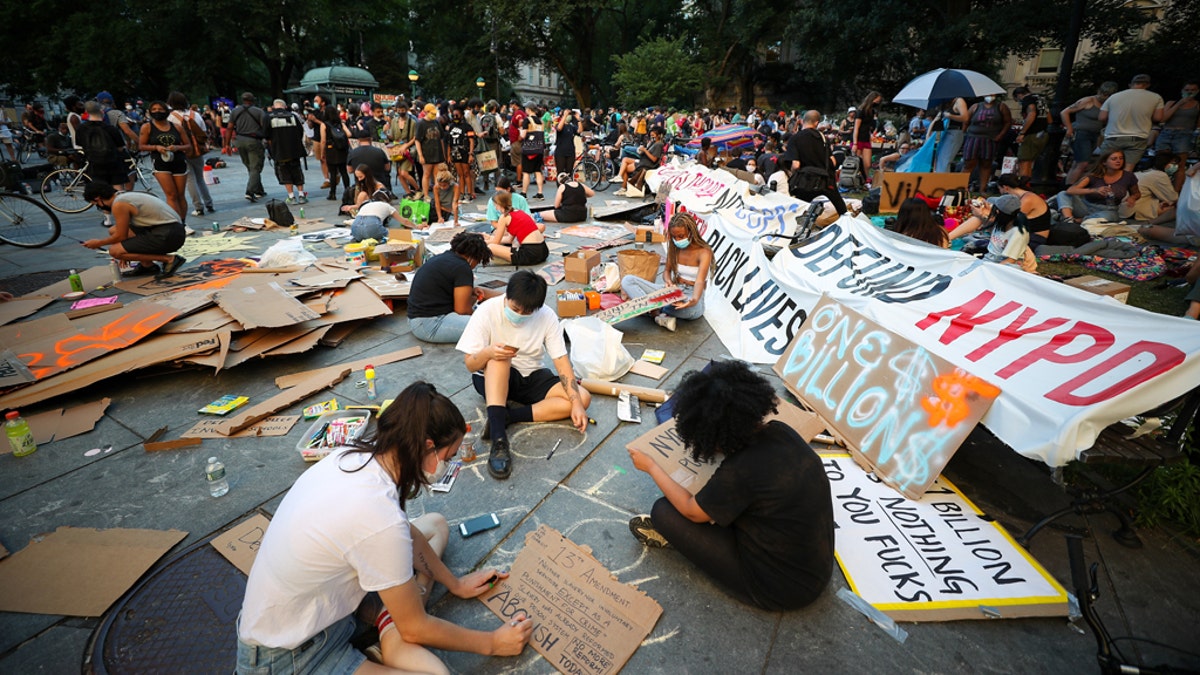
A group of Black Lives Matter protestors prepare banners at City Hall across from One Police Plaza as part of the "Defund NYPD" and "Occupy City Hall" movement after spending the night on June 24, 2020 in New York City. (Anadolu Agency via Getty Images)
From her purview, one of the main factors leading to crime is poverty and hunger – which in turn drives drug use and drug-related crimes. Thus helping addicts could address some societal ills.
"As we address these particular concerns, and at the same time build restorative justice practices, and build out our mental health response teams, and build medic responses," she said, "[These are] responses that really actually deal with the issues that are in place. Then we will have less crime anyway."
ANTI-POLICE DEMONSTRATIONS MAY HAVE SPARKED NEW CORONAVIRUS CASES, SOME CITIES NOW ACKNOWLEDGE
Ndgo said the community should deal with the issues from "the ground up," using the money that would have otherwise been poured into the city's police department.
"There are plenty of people who have been murdered as a result of mental health checks. The police came, and then they murdered the person, even though the person was acting erratically, which is what you would expect of a person who's having a mental health crisis," Ndgo said. "Domestic confrontations are also things that police are often called for. And these are kinds of situations that can be handled by different kinds of professionals. As it relates to more violent crime, there would still be trained individuals who are prepared to handle those kinds of situations."
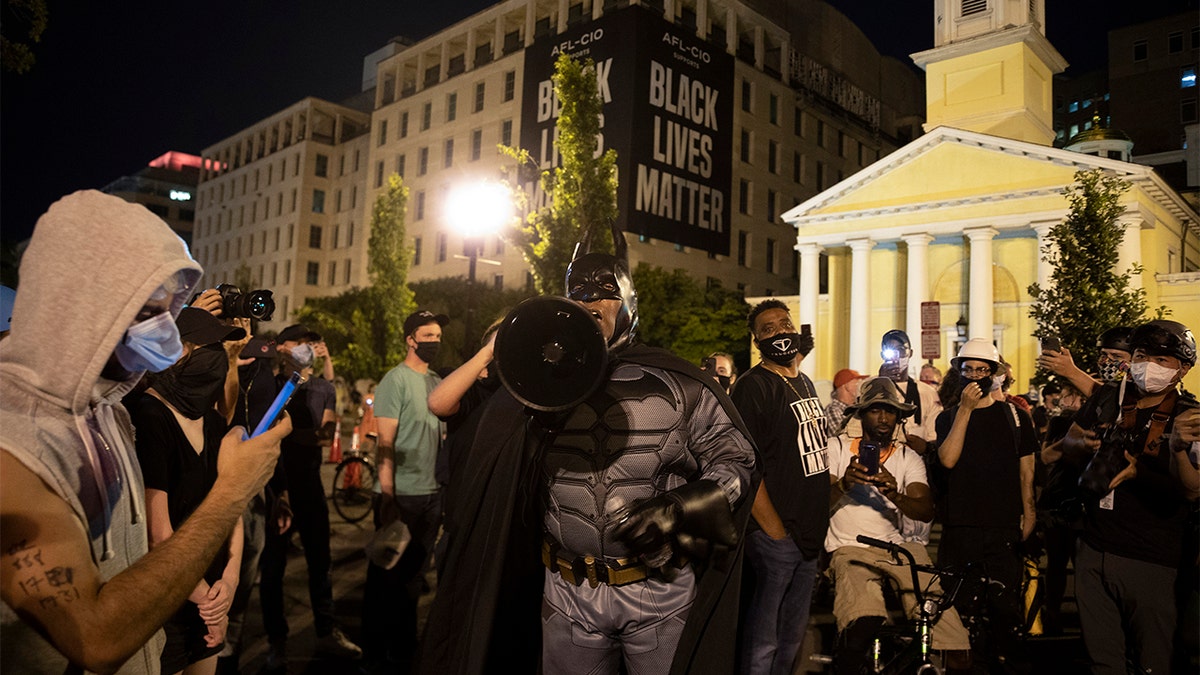
Protesters gather on Black Lives Matter Plaza after they attempted to pull down the statue of Andrew Jackson in Lafayette Square near the White House on June 22, 2020 in Washington, DC. Protests continue around the country over the deaths of African Americans while in police custody. (Getty)
In contending that the history of the police is "centered around the ruling class and protection of the ruling class and being an extension of the system of oppression," Ngdo claims that police have done little to make communities safer.
"Quite often, if there is violence happening, by the time the police arrive, that has already occurred and particularly in poor neighborhoods and in black and brown communities. So the police are not really a resource for preventing that kind of crime from happening. Just a response," she explained.
Moreover, the Philadelphia-based activist believes that violence exists on many levels, not just stemming from law enforcement.
"We also recognize that hunger, unnecessary hunger, is a form of violence, as is unnecessary homelessness (especially) when you have massive numbers of properties that are empty, and then we have people who are all over the city living in tents. We see that also as violence," Ndgo said. "Another example is the fact that a lot of our schools are not safe for our children. There is lead paint in a lot of the schools. So students are being expected to learn in environmentally hazardous places, those are things that we see as violence."
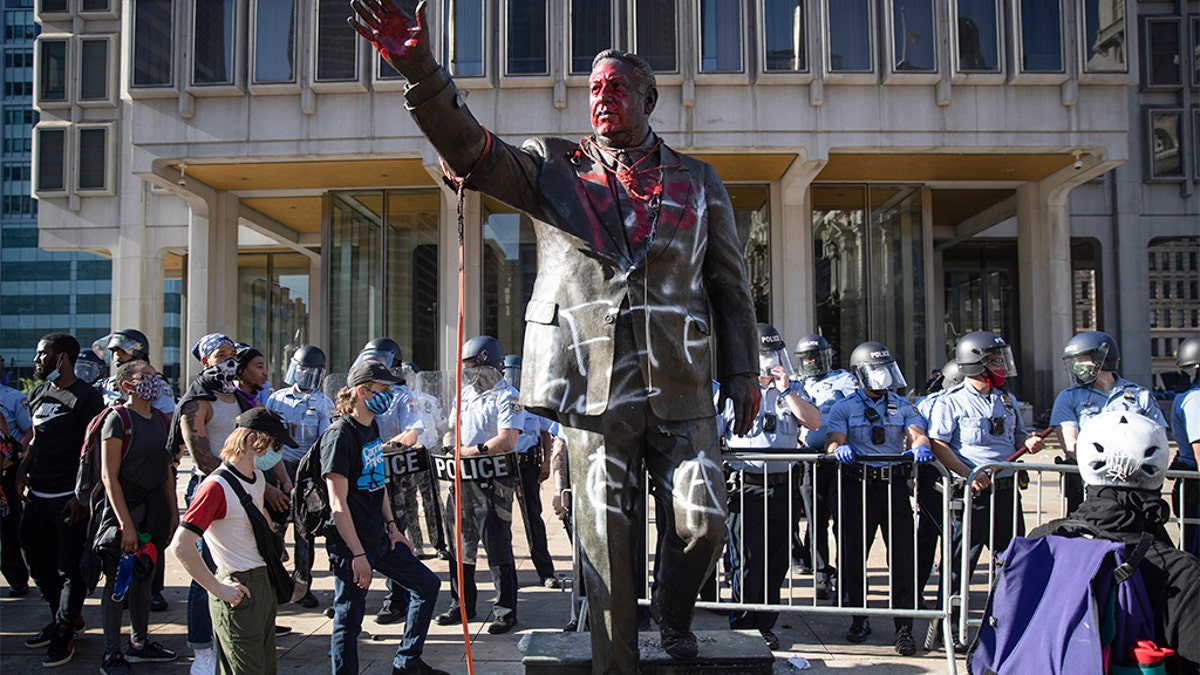
In this Saturday, May 30, 2020 photo police stand near a vandalized statue of controversial former Philadelphia Mayor Frank Rizzo in Philadelphia, during protests over the death of George Floyd, who died May 25 after he was restrained by Minneapolis police. Workers early Wednesday, June 3 removed the statue which was recently defaced during the weekend protest. (AP)
She said when BLM has called for these changes, they are presented with government promises she calls a sort of "smoke and mirrors."
"(The administration wants) to come across as if (they are) responding to the demands that people are making, but they're not genuine responses," Ngdo said. "An example is one of (our) demands to decrease the police budget."
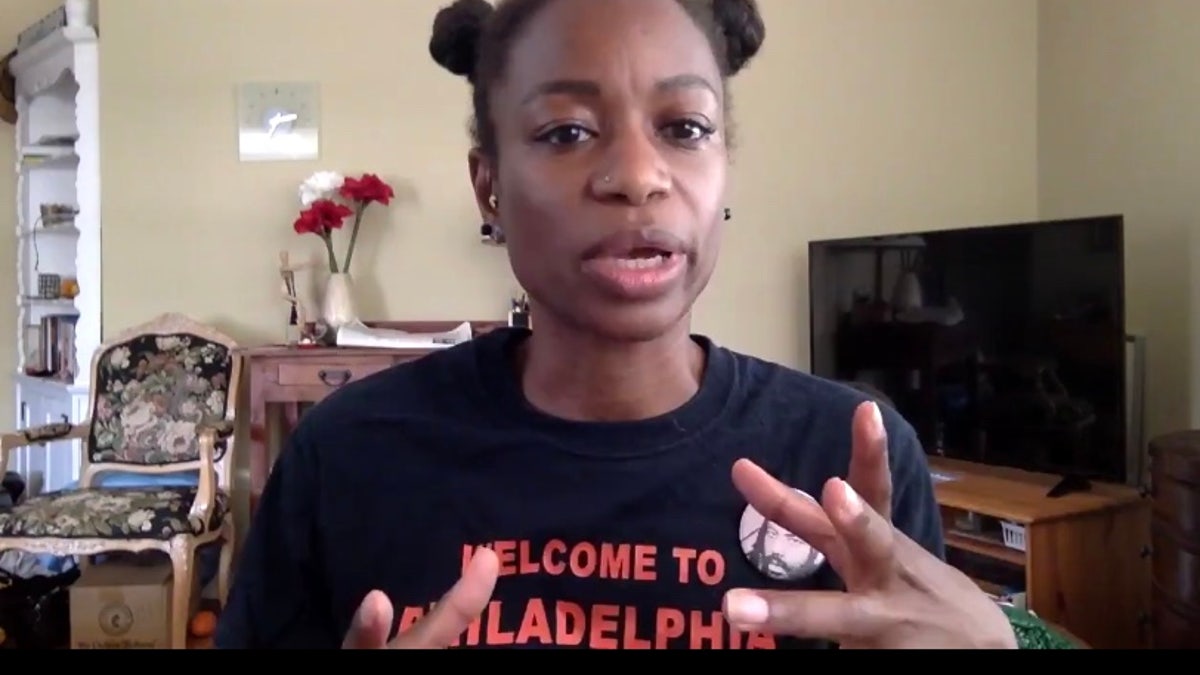
YahNé Ndgo, a leader in the Black Lives Matter (BLM) Philadelphia chapter (Fox News)
The police department was trying to increase its budget by $14 million but relented after last month's unrest. The $14 million was moved elsewhere, according to the Philadelphia Inquirer.
BLM Philadelphia also wants to see changes on a federal level. Ngdo said that the president has the authority to call in the National Guard irrespective of whether the governors or mayors approve it, a power they view as perpetrating "danger and harm."
"You see now, the president can have any kind of mindset. And then (they) have a local military force at his or her disposal in order to push that mindset onto communities," Ngdo cautioned. "That would be one thing really important, to transform that policy."
She said another critical change would be for the "federal government to actually prioritize the financial discrepancies and inequities in all of our communities."
"The wealth of the nation is very much into the hands of a very small group of people," Ngdo said. "And the result of that is a massive amount of poverty and poverty, as often, as I mentioned earlier, is a big reason that a lot of crime happens."
DEFUND OR DISMANTLE THE POLICE? WHAT IT COULD MEAN
The chapter envisions programs led by the Department of Defense – including programs that "takes military-grade equipment and transfers it into local police departments," as well as the Trump administration's 2019 Relentless Pursuit program that gives funding to local police departments – coming to an end.
"It just increases the resources to these police terror groups. And so shifting those resources from that, you have these federal resources that are being used in these ways that could easily be shifted into the communities to address these issues around poverty," Ngdo said.
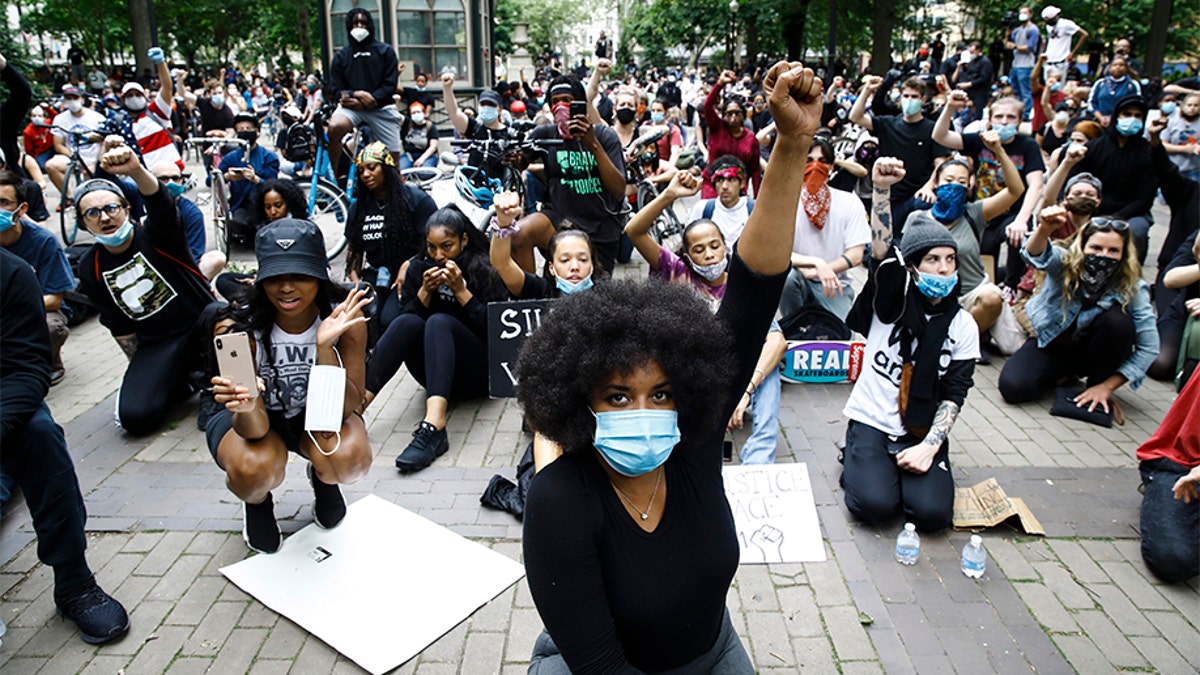
Demonstrators chant Tuesday, June 2, 2020, at Rittenhouse Square in Philadelphia, during a protest over the death of George Floyd, who died May 25 after he was restrained by Minneapolis police. (AP)
She pointed out that "there are over 800 U.S. military bases around the world," in addition to the Pentagon's AFRICOM program, "which puts military bases in almost every country on the African continent."
According to Pentagon maps published by The Intercept in February, there appear to be U.S. bases on 29 of the 54 countries that make up Africa. Those bases, she said, should be defunded.
"(Defunding) these particular programs would provide massive amounts of resources for the communities in the United States, and that would mitigate most of the problems that create the so-called problem of crime," Ngdo said.
In terms of BLM Philadelphia, Ngdo wouldn't give membership numbers but said the group is made up of a number of organizers, including a number of educators from elementary to university level and that everyone has a different focus – with children's safety and education at the hub of their discussions and policy proposals.
Despite the unrest of the past few weeks, Ngdo is optimistic that real change is coming – exemplified by the recent bringing down of the statue commemorating former police commissioner Frank Rizzo, who she defined as "very aggressive, very racist and very violent" in his response to Black communities.
"Of course, there is the pain and the trauma that comes from the ongoing violence that we've experienced. But there is also the hope that people have as a result of this ongoing state of rebellion, that people have finally reached their limit," she said.
CLICK HERE TO GET THE FOX NEWS APP
Unlike BLM protests that have happened in years past, Ngdo believes this time is different.
"[The death of George Floyd] took people to a place where they just can't stand to live in a world where this is perpetuated," she said. "People are in a place where they're having to really be pushed to make a decision about what kind of person they want to be and what side do they want to stand on in history. And a lot of people have decided that they want to stand on the side of justice, and they want to figure out how to do that."










































